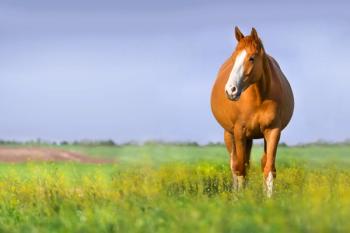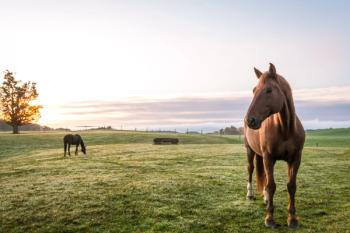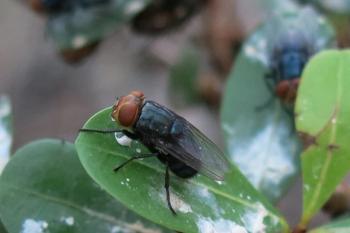
Groups urge USDA to crack down on equine soring
The Humane Society of the United States has petitioned the U.S. Department of Agriculture to expand the Horse Protection Act to make the use of numbing or masking drugs to hide underlying soring a felony offense.
NATIONAL REPORT — The Humane Society of the United States (HSUS) has petitioned the U.S. Department of Agriculture (USDA) to expand the Horse Protection Act to make the use of numbing or masking drugs to hide underlying soring a felony offense.
Soring is the practice of intentionally inflicting pain through the use of chemical irritants, broken glass wedged between a horse's shoe pads and sole, or overly tightened metal hoof bands, according to the American Veterinary Medical Association (AVMA). The resulting pain forces the horse to lift its legs faster and higher, exaggerating its natural gait.
The HSUS petition states that although soring has long been illegal under the Horse Protection Act, a recent report by the USDA's Animal and Plant Health Inspection Service (APHIS) shows that nearly 98 percent of samples taken at Tennessee Walking Horse competitions in 2011 were positive for prohibited foreign substances, and all 52 horses at the most recent Tennessee Walking Horse National Celebration tested positive for illegal agents.
The American Association of Equine Practitioners (AAEP) in 2008 called for the elimination of the "culture of abuse" of soring horses and released recommendations for how the walking horse industry could eliminate soring, calling it "one of the most significant welfare issues affecting any equine breed or discipline."
The Tennessee Walking Horse National Celebration promised to strengthen its commitment to protecting horses at that time, but AAEP spokesperson Sally Baker says soring is still happening at equine events.
"It really hasn't changed," Baker says. "Some of these industry groups say violations have dropped, which may statistically be the case, but they are still occurring."
The Tennessee Walking Horse National Celebration did not return phone calls regarding its progress on AAEP's recommendations by press time.
The HSUS and other horse protection advocates filed a similar petition in 2010, asking the USDA to better enforce the Horse Protection Act as it pertained to soring, but the HSUS says the agency has yet to respond to the petition and says a lot more could be done to prosecute violators of the Horse Protection Act. AAEP agrees.
"It is hard for us at AAEP to know with certainty what changes have actually been made in compliance with (our recommendations)," says Harry Werner, VMD, a solo equine practitioner in Connecticut, former AAEP president, and current chair of the AAEP's welfare committee. "Like so many things, we can advocate changes, but the industry itself will have to implement the changes. They're the ones—the only ones, really—that can solve this problem."
It's difficult to gauge how much the horse industry has changed, but Werner says leading officials in the walking horse industry indicate that they're on board with AAEP's recommendations and making progress on changes. "They are also forthcoming that much progress needs to be made," he adds. "I truly believe that things are improving, (but) there's no reason to think this problem is close to being resolved. ... It's clear from the USDA data that there is still a lot of this practice going on, and way too much going on."
"Soring is an ongoing concern for us," Baker continues, adding that the AAEP isn't the only group fighting the practice. A number of groups are joining in the effort to see the practice stopped, including the American Veterinary Medical Association (AVMA). "The AVMA has really become very aggressive, as well, about ending the practice of soring."
At the start of the gaited horse show season in April, the AVMA spoke out on the issue of soring. "It's time for this egregious form of animal cruelty to end," says René Carlson, DVM, president of the AVMA. The AVMA reported recently on indictments against several Tennessee horse trainers who were involved with soring for at least eight years and sentenced to a range of one to 20 years in prison, with fines ranging from $1,000 to $250,000. And these weren't the only cases of Horse Protection Act violations—the USDA identified 1,111 violations in 2011—but the AVMA says the fact that the cases were brought to court signals a new trend. The Tennessee indictments mark some of the first criminal indictments for Horse Protection Act violations in two decades, the AVMA says.
The indictment and subsequent convictions were the result of a seven-month investigation conducted by the USDA Office of Inspector General (USDA-OIG) Agent Julie McMillian, according to the U.S. Attorney's Office for the Eastern District of Tennessee.
"The crime committed by the individual in this conspiracy is an example of a widespread problem in the equine industry that gives unfair and illegal advantage to some competitors over others, in addition to causing cruelty to the animals," says U.S. Attorney Bill Killian. "This issue has our attention, and we will continue to pursue violators of the Horse Protection Act to assure fairness in competition and to protect the welfare of the horses that are a symbol of our state."
But Baker says limited USDA funding to police the practice of soring is part of the problem. The USDA's own Office of the Inspector General noted in a fall 2010 audit that APHIS's program for inspecting horses for soring was not adequate, and funding for the program has since been increased.
The AVMA agrees that inadequate budget is an area of concern. "USDA inspectors are doing everything possible to detect evidence of soring before horses are allowed to compete," Carlson says. "Unfortunately, due to budget constraints, USDA inspectors are only able to attend a small number of the shows being held. It is going to take a team effort to put an end to the inhumane practice of soring horses, so America's veterinarians stand in support of government regulators and the walking horse industry in their horse protection efforts."
In February, the AVMA and AAEP sent a joint letter to the USDA with recommendations and concerns about enforcing the Horse Protection Act as it pertains to horse soring. In the letter the associations ask the USDA to decertify noncompliant horse industry organizations and prosecute civil and criminal cases involving soring in a timely and aggressive manner.
"While we were very pleased to learn of last November's successful prosecutions under the (Horse Protection Act), more than 400 federal tickets were issued at the National Celebration in 2010 and few were prosecuted or resulted in penalties," the AAEP and AVMA wrote. "Without effective and timely prosecution of federal cases, violators will continue to exhibit sore horses, and deterrence derived from federal prosecution is undermined. Furthermore, when large numbers of federal tickets are issued and not pursued, it adversely impacts (the USDA's) credibility."
Additionally, show management should be held responsible for Horse Protection Act violations, and foreign substance violations should be reported and prosecuted. Other suggestions include using undercover observation, drug testing, pulling pads and shoes on padded horses, and requesting additional funding for enforcement efforts.
Although there is agreement on the fact that soring is a practice that needs to be stopped, not everyone believes the HSUS's petition offers the right solution. "HSUS's news release accusing the walking horse industry of doping horses and petitioning the USDA to make using illegal numbing or masking chemicals on a horse's leg a felony is a blatant attempt to mislead the public, discredit the Tennessee Walking Horse and promote their agenda," says Steve Mullins, DVM, president of S.H.O.W. (Sound Horses, Honest Judging, Objective Inspections and Winning Fairly)—a horse industry organization certified by the USDA that began inspecting Tennessee Walking Horses in April 2009.
"In the first place, as HSUS well knows, the USDA already possesses the ability to criminally prosecute for illegal substances. Claiming to petition the USDA to do something they already have the power to do is disingenuous at best and dishonest at worst," Mullins explains. "In addition, for the HSUS to request a 'policy' change or a rulemaking by the USDA regarding its internal authority and responsibility seems to raise the question—just how much influence does the HSUS have with the USDA?"
Werner agrees that the Horse Protection Act already prohibits anything done to avoid detection of horse soring. He isn't quite sure, since HSUS even acknowledges this fact in its petition, what additional good it would do to ask the USDA to make the masking of soring a felony offense. "Maybe what they mean by asking it to be prosecuted for a felony is perhaps they are implying that prosecution has not been to the fullest extent of the law," Werner says.
The AAEP is in favor of any action that would result in the strongest prosecution allowed by law, he adds. That's not meant as an attack on the walking horse industry, he notes, but to ensure the health of horses. "If that means USDA pulls out all the stops, so be it," Werner says. "The Tennessee Walking Horse industry has had half a century or more to make these changes and they haven't done it. If you're going to have rules, they've got to be enforced ... what they're doing is wrong, it's cruel and it needs to stop."
The USDA could not be reached for comment on the status of HSUS' petition by press time.
Newsletter
From exam room tips to practice management insights, get trusted veterinary news delivered straight to your inbox—subscribe to dvm360.





